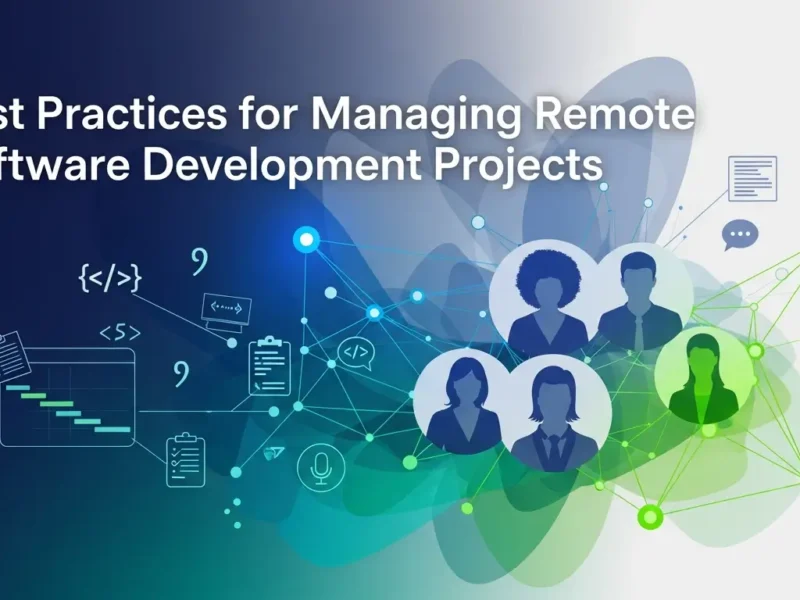The globalized economy has opened up unprecedented opportunities for businesses seeking to innovate and scale efficiently. Among these, offshore software development has emerged as a cornerstone strategy for companies looking to reduce costs, access specialized talent, and accelerate time-to- market. However, the success of this strategy hinges critically on one factor: selecting a reliable offshore software development partner. This isn’t merely about finding the cheapest option; it’s about identifying a strategic ally that aligns with your vision, understands your needs, and possesses the expertise to deliver high-quality solutions.
In today’s competitive landscape, the decision to outsource software development offshore can be a game-changer. It allows businesses to tap into a vast pool of global talent, often at a more cost-effective rate than onshore alternatives. Moreover, it provides flexibility and scalability, enabling companies to adapt quickly to market demands without the overhead of building an in-house team. But with countless providers vying for your attention, how do you sift through the noise and identify a partner that truly stands out? This comprehensive guide will walk you through the essential criteria to consider, ensuring you make an informed decision that drives long-term success.
1. Proven Expertise and Technical Proficiency
The foundation of any successful software project lies in the technical capabilities of the development team. When evaluating potential offshore partners, their expertise and technical proficiency should be paramount. Don’t just take their word for it; delve into their portfolio, case studies, and client testimonials.
Key areas to assess include:
- Diverse Technology Stack: Do they specialize in the technologies relevant to your project (e.g., Python, Java, .NET, React, Angular, cloud platforms)? A broader understanding of various tech stacks indicates versatility and adaptability.
- Industry-Specific Experience: Has the partner worked on projects within your industry? Industry-specific knowledge can significantly reduce the learning curve and lead to more tailored, effective solutions.
- Quality of Past Projects: Request to see live demos or access to their previous work. This provides tangible evidence of their coding standards, UI/UX design capabilities, and overall project quality.
- Certifications and Accreditations: Look for certifications from recognized bodies, which often signify a commitment to quality and adherence to industry best practices.
- Team Skillset and Experience: Understand the experience level of the developers who will be assigned to your project. Senior developers bring valuable insights and problem-solving skills.
2. Robust Communication and Collaboration Framework
Effective communication is the lifeblood of any successful offshore partnership. Geographic distance and time zone differences can pose challenges, but a reliable partner will have established robust communication and collaboration frameworks to mitigate these.
Consider the following:
- Communication Tools and Channels: What tools do they use for daily communication, project management, and video conferencing (e.g., Slack, Jira, Trello, Zoom)?
- Frequency and Transparency of Updates: How often will you receive updates on project progress? A good partner will offer regular, transparent reports and be proactive in flagging potential issues.
- Language Proficiency: Ensure that the development team has excellent English proficiency (or your preferred language) to prevent misunderstandings and facilitate smooth interactions.
- Dedicated Project Manager: A dedicated project manager acts as your primary point of contact, streamlining communication and ensuring project alignment.
- Time Zone Management: Discuss how they manage time zone differences to ensure adequate overlap for crucial meetings and real-time collaboration.
3. Transparent Development Processes and Methodologies
A reliable offshore partner will operate with clear, well-defined development processes and methodologies. Transparency in their workflow allows you to track progress, understand challenges, and maintain control over your project. When assessing an offshore software development company, their process transparency is a key indicator of reliability.
Look for:
- Agile Methodologies: Most modern software development projects benefit from agile frameworks (Scrum, Kanban). These promote iterative development, flexibility, and continuous feedback.
- Documentation Standards: Do they adhere to rigorous documentation standards for code, architecture, and project requirements? Good documentation is crucial for maintainability and future scalability.
- Quality Assurance (QA) and Testing: A robust QA process is non-negotiable. Inquire about their testing strategies, including unit testing, integration testing, system testing, and user acceptance testing (UAT).
- Code Review Practices: Regular code reviews help maintain code quality, identify bugs early, and ensure adherence to best practices.
- Version Control Systems: Ensure they use industry-standard version control systems (e.g., Git) to manage code changes and facilitate collaborative development.
4. Strong Security and Intellectual Property (IP) Protection
Outsourcing involves sharing sensitive information and intellectual property. Therefore, a reliable offshore partner must have stringent security measures and robust IP protection policies in place.
Essential considerations include:
- Non-Disclosure Agreements (NDAs): A comprehensive NDA should be a fundamental part of your agreement, protecting your confidential information.
- Data Security Protocols: Inquire about their data encryption methods, access controls, and measures to prevent unauthorized access to your data.
- Physical Security: If applicable, understand the physical security measures at their development facilities.
- Compliance with Regulations: Do they comply with relevant data protection regulations such as GDPR, HIPAA, or CCPA?
- IP Ownership: Ensure that the contract clearly states that all intellectual property developed during the project belongs to your company.
5. Client Testimonials and References
The best way to gauge a potential partner’s reliability is through the experiences of their past and current clients. Client testimonials and references offer invaluable insights into their professionalism, delivery capabilities, and overall client satisfaction.
- Request References: Ask for contact information for a few of their recent clients and reach out to them.
- Inquire About Specifics: When speaking with references, ask about their experience with communication, project management, quality of deliverables, and how issues were resolved.
- Look for Red Flags: Be wary of partners who are unwilling to provide references or whose testimonials seem overly generic.
6. Scalability and Flexibility
Your business needs can evolve rapidly. A reliable offshore partner should be able to scale their team up or down to match your project’s changing requirements, offering flexibility without compromising quality or timelines.
- Team Augmentation Options: Can they quickly onboard additional developers if your project scope expands?
- Contract Flexibility: Review their contract terms regarding project duration, team size adjustments, and termination clauses.
- Adaptability: How do they handle changes in project requirements or unforeseen challenges?
7. Cost-Effectiveness vs. Lowest Price
While cost savings are a primary driver for offshore development, prioritizing the lowest price often leads to compromises in quality, communication, and ultimately, project success. Focus oncost-effectiveness, which balances price with value, expertise, and reliability.
- Transparent Pricing Model: Understand their pricing structure (e.g., fixed-price, time & material, dedicated team).
- Hidden Costs: Clarify any potential hidden costs such as infrastructure, software licenses, or support.
- Value Proposition: Evaluate what you are getting for the price – experienced developers, robust processes, strong communication, and high-quality deliverables.
Conclusion: Building a Lasting Partnership
Choosing a reliable offshore software development partner is a critical strategic decision that can significantly impact your business’s trajectory. It’s about much more than just finding a vendor; it’s about forging a collaborative partnership built on trust, transparency, and mutual understanding. By diligently evaluating potential partners based on their proven expertise, communication frameworks, transparent processes, security measures, and client satisfaction, you can mitigate risks and set the stage for successful project delivery.
Don’t rush the selection process. Invest the time to research thoroughly, conduct in-depth interviews, and verify claims. The right partner will not only deliver exceptional software but will also become an extension of your team, contributing to your long-term innovation and growth.



